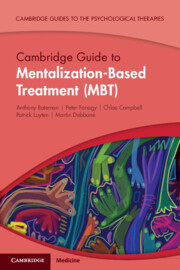Book contents
- Cambridge Guide to Mentalization-Based Treatment (MBT)
- Cambridge Guides to the Psychological Therapies
- Reviews
- Cambridge Guide to Mentalization-Based Treatment (MBT)
- Copyright page
- Contents
- Preface
- A Note from the Series Editor
- Acknowledgments
- Part I Overview of the Model
- Chapter 1 A History of Mentalizing and Mentalization-Based Treatment
- Chapter 2 The Supporting Theory of Mentalization-Based Treatment
- Part II The Mentalization-Based Treatment Model in Practice
- Part III Application and Adaptations for Mental Health Presentations
- Part IV Application of Mentalization-Based Treatment in Different Populations and in Different Settings
- Index
- References
Chapter 2 - The Supporting Theory of Mentalization-Based Treatment
from Part I - Overview of the Model
Published online by Cambridge University Press: 18 May 2023
- Cambridge Guide to Mentalization-Based Treatment (MBT)
- Cambridge Guides to the Psychological Therapies
- Reviews
- Cambridge Guide to Mentalization-Based Treatment (MBT)
- Copyright page
- Contents
- Preface
- A Note from the Series Editor
- Acknowledgments
- Part I Overview of the Model
- Chapter 1 A History of Mentalizing and Mentalization-Based Treatment
- Chapter 2 The Supporting Theory of Mentalization-Based Treatment
- Part II The Mentalization-Based Treatment Model in Practice
- Part III Application and Adaptations for Mental Health Presentations
- Part IV Application of Mentalization-Based Treatment in Different Populations and in Different Settings
- Index
- References
Summary
The development of mentalizing and non-mentalizing is discussed along with the importance of mentalizing as a psychotherapy process in the treatment of mental health problems. A defining feature of mental disorder is the experience of “wild imagination,” and we consider that mentalizing difficulties—that is, the tendency to get caught up in unhelpful ways of imagining what is going on both for ourselves and for other people—are the price we as a species pay for the immense benefits of the human imagination. Mental health problems arise when mentalizing is lost and we use mentalizing processes that are from earlier stages of development. The relationships between mentalizing, use of low mentalizing modes, epistemic trust and distrust, and social processes are summarized.
Keywords
- Type
- Chapter
- Information
- Publisher: Cambridge University PressPrint publication year: 2023

